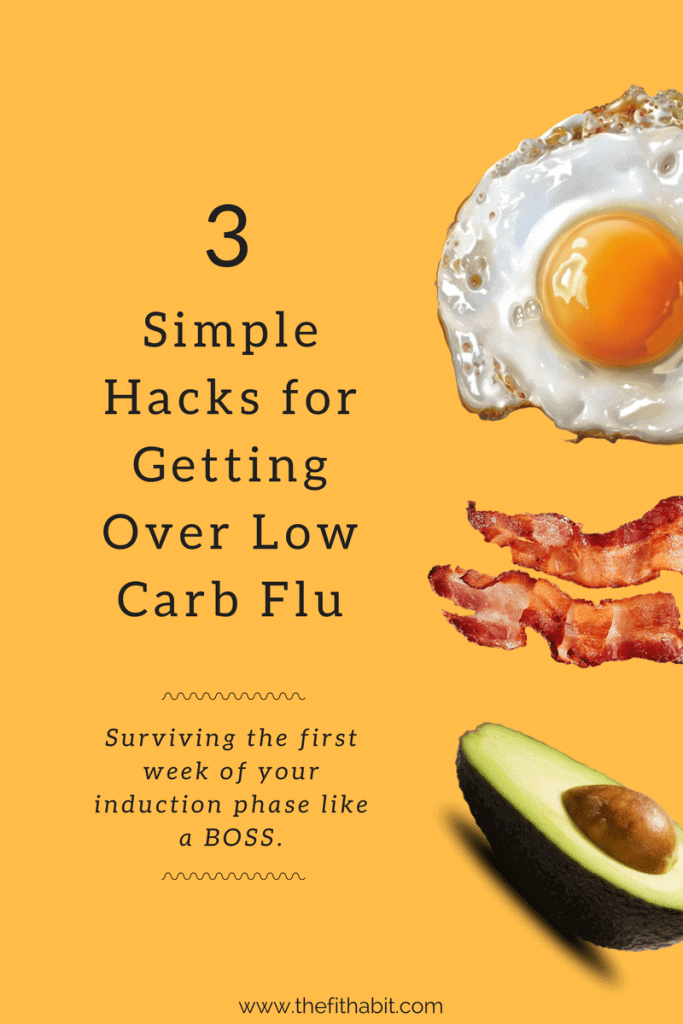If you've ever started a low carb diet and suddenly felt let you've been hit by a bus, you're not alone. Carb flu, is an unfortunate experience many low carb-dieters run into. Read on to learn what it is, and how to avoid it.

Yesterday, I had my body composition tested. I knew I had gained some weight since January and I wanted a DexaScan to tell me exactly how much of that was body fat vs. lean muscle.
So the bad news is that I gained almost 4lbs. The GREAT news is that 1.6lbs of that is lean muscle.
Woohoo! I’ll take it!
Related: Low Carb / High Protein Healthy Snacks for the Road
Here’s why I gained weight

For the past 3 months, I have not restricted carbs. I haven’t gone completely off the rails either, but I have been incorporating more bread, tortillas, crackers, and the occasional pizza into my diet. This wasn’t intentional, but the funny thing is that the more carbs you eat, the more you crave, so it’s been a slow and steady increase over the last few months.
During this time, I kept telling myself “oh, I can have handfuls of this sugary granola or a slice of toast, it won’t make a difference….” And if it was just one handful or slice, it wouldn’t. But making that same compromise every day adds up, and here I am 4 lbs later, wondering WTF just happened.
Related: Make any healthy food taste good with these 3 things.
Here’s why I gained muscle
For the exact same reason as above. Muscles grow with carb intake, but in most cases, so does fat. That’s why bodybuilders go through that “bulk phase” where they eat all the carbs and gain a ton of mass, both in fat and muscle. Then they go through the “cut phase” where they diet down, lose the fat, and unfortunately, some of that precious muscle as well. It’s difficult not to do one without the other.
So what do I do to lose the weight but not the muscle?
First off, I'm celebrating the muscle gain. I can see it in my shoulders and I think it looks amazing. I’m happy about my muscle growth because it look great, it helps with bone density (I had that tested too, and it’s really good), it keeps my metabolism high and it will keep me looking younger, longer. Like I said, I’ll take it!
But now it's time to back off the carbs. Sometimes I like to cycle more carbs in my diet, just to see if my body can now miraculously handle them better, but clearly, it can’t. If I give myself even a little room for bread and other goodies (that I love) I just want more, and it’s a slippery downhill slope from there.
So, carbs and I are breaking up (again). I’m focused on getting back into a fat adapted state and look forward to feeling leaner in no time.
Getting Past Carb Flu
If you’ve ever tried cutting carbs before, you’re probably aware of how this process goes:
- Headaches
- Low energy
- Cranky as all getup
- Tired all. the. time.
- Poor muscle recovery after workouts
- Brain fog
This is a natural phase that your body goes through as it adjusts from using glucose (carbs) as its primary source of energy to using stored body fat. It can take a few days to a few weeks to adjust, so expect to feel crappy for a while and use these simple tricks to help you adjust:
- Increase your salt - as your body starts becoming more fat adapted, it releases water retention and precious electrolytes go with it. To combat this, salt your food (ignore this advise if your Dr wants you to manage your sodium intake). I also recommend using a pre-workout during this phase as it will replenish electrolytes and give you a little boost of energy. I use this brand as it’s not overly expensive and I like the flavor.
- Increase your magnesium & potassium - Releasing all that water weight will also jeopardize your mineral levels. You can take these in a supplement form, or just eat more leafy greens which are great low carb options for maintaining a balanced, healthy diet. Spinach, chard, kale and avocado are all your friends 🙂
- Adjust your workouts - this is NOT the time to be doing high-intensity workouts. During your “induction phase” or carb flu, as we’re calling it, your body is doing a lot of internal work. Give it a break by focusing on restorative movement like yoga, Piyo or just walking.
Overall, it’s really important to stay hydrated (this won’t be a problem as you’ll naturally feel much more thirsty) and trust the process. Expect to not feel like yourself for a few days or even a week or two, but remember, once you get through this phase, you will come out the other end feeling amazing and much leaner!
Related: How to Carb Cycle Your Diet As a Runner
Good luck!
PS - If you want to nerd out on this and really understand the science behind why low carb eating works, I HIGHLY recommend you read The Art and Science of Low Carb Living.


Caren is a certified yoga teacher, fitness instructor and ADHD Coach. As the founder of The Fit Habit, she shares ADHD-friendly self-care, food & fitness inspiration, along with practical ways to foster mind + body wellness.



Leave a Reply